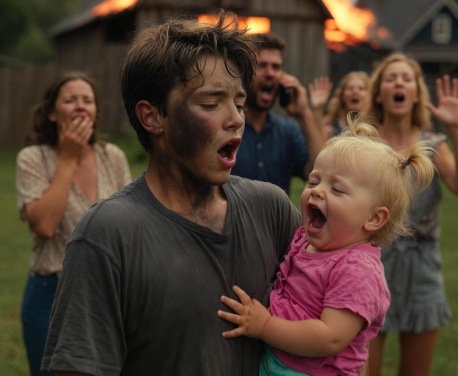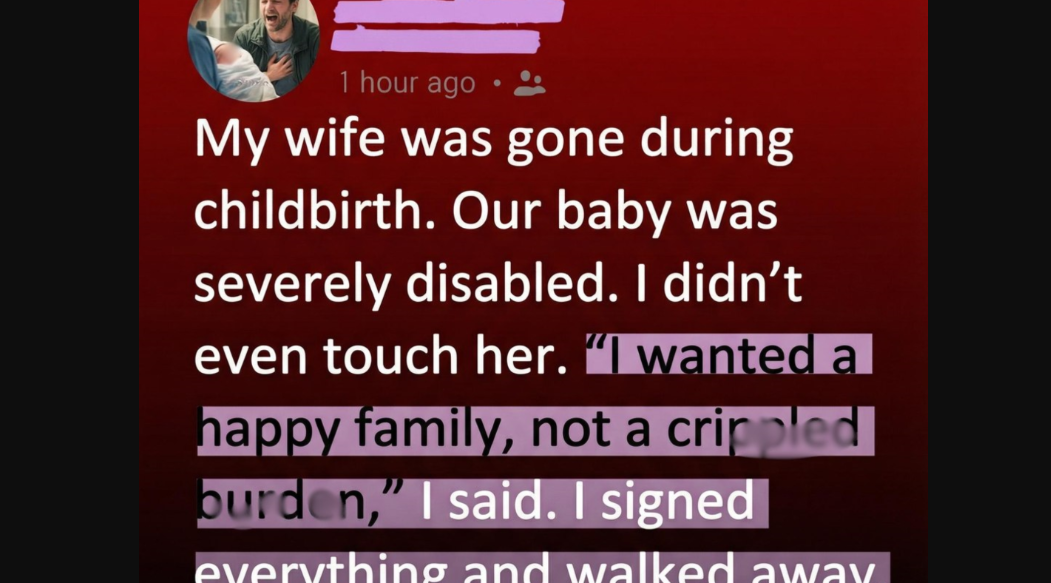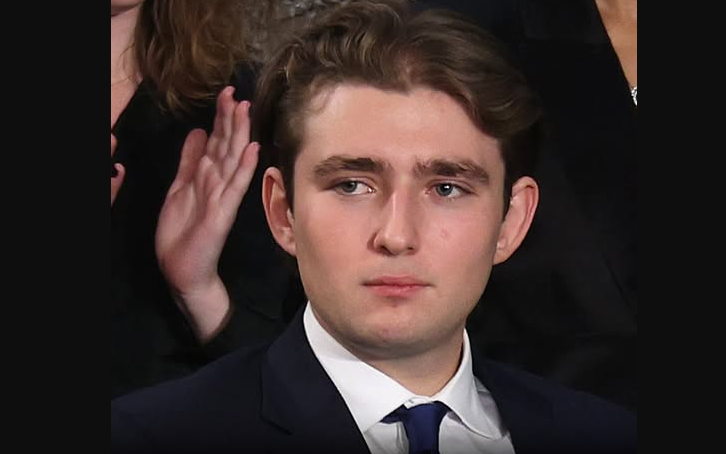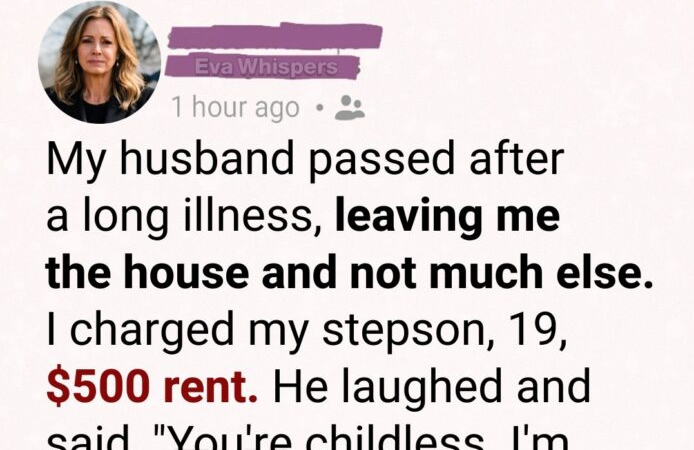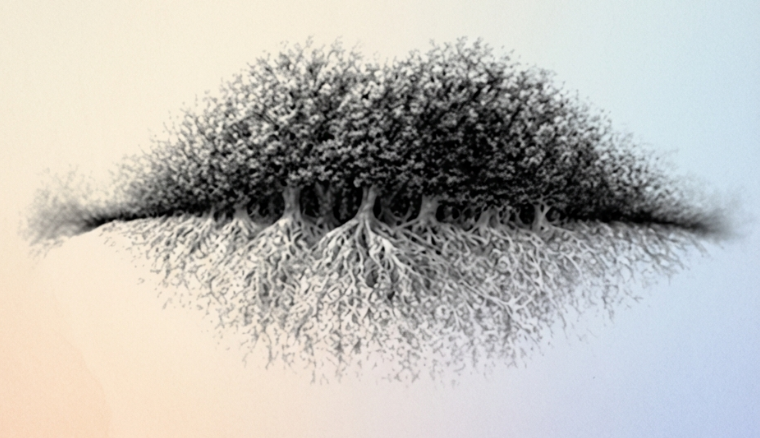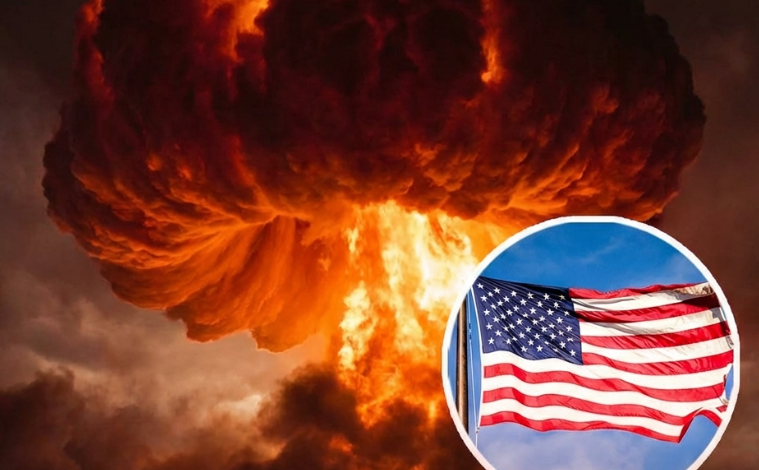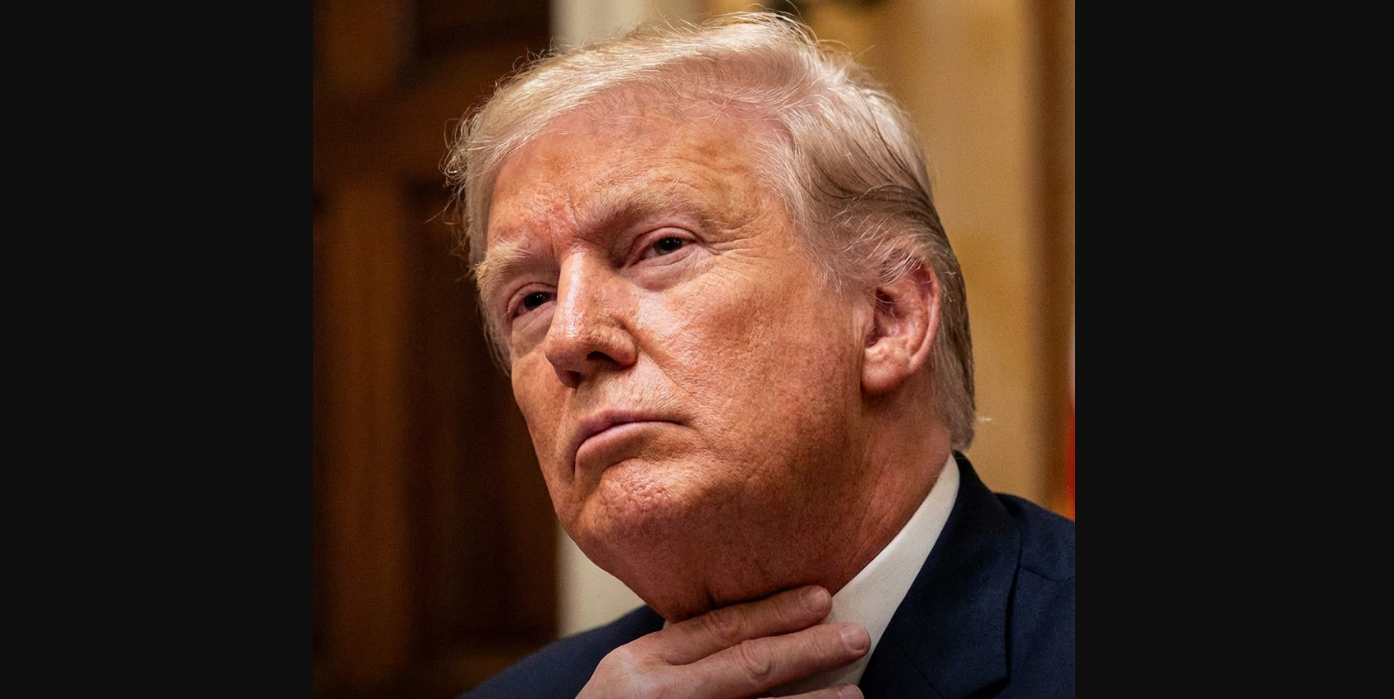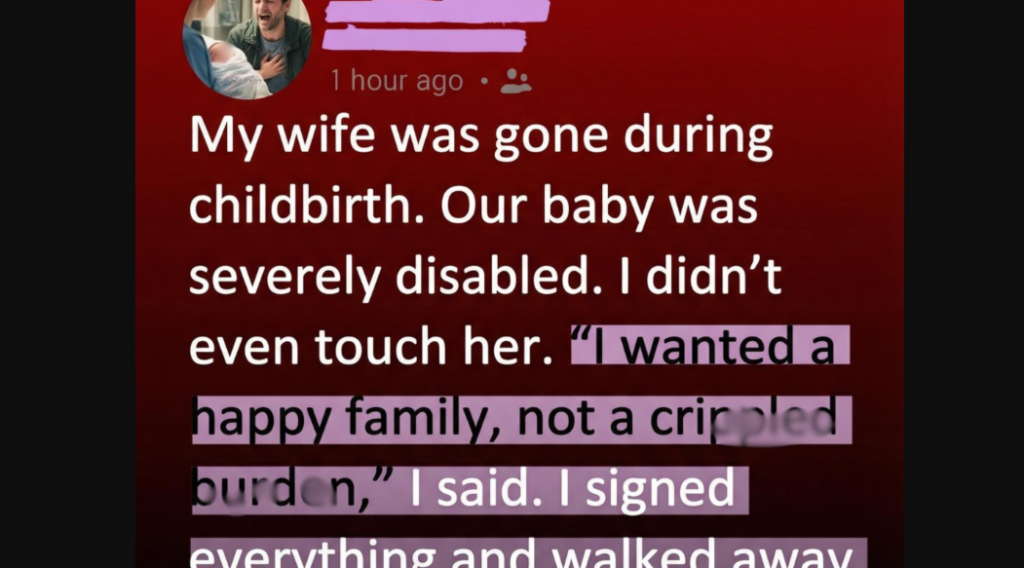The day after my son saved a toddler from a blazing shed, we found an unusual message on our doorstep. It directed us to encounter a stranger in a red limousine at 5 a.m. near my son’s school. At first, I contemplated disregarding it. But intrigue prevailed over me. I should have recognized then that my decision would alter everything.
It marked one of those flawless autumn afternoons in Cedar Falls last Saturday. The air held aromas of cinnamon and wood smoke. Our neighborhood organized a relaxed gathering—parents enjoying hot cider while children raced about with juice boxes in hand. For a period, everything appeared perfect.
Someone arranged a fire pit in the Johnsons’ backyard, while the Martinezes prepared burgers, the scent of charcoal floating on the cool breeze. I conversed with a neighbor about the approaching school fundraiser when I observed my 12-year-old son, Ethan, standing calmly near the cul-de-sac.
Abruptly, the shed behind the Martinez house erupted in flames. Fire ascended the wooden walls immediately. At first, everyone assumed it stemmed from grill smoke, but the orange radiance soon confirmed otherwise, and alarm spread through our assembly.
Then echoed the sound that still haunts my dreams—the frightened cry of a baby emerging from near that flaming shed. Before my mind could comprehend the events, Ethan acted. He discarded his phone into the grass and dashed directly toward the fire without pause.
“ETHAN, NOOOO!” I yelled, observing in terror as my son vanished into the dense, suffocating smoke.
Time distorted as I remained immobile, fixated on the location where he had disappeared while the flames surged higher. My daughter Lily grasped my arm so firmly her nails embedded, but I scarcely noticed it amid the throbbing in my ears. Parents hurried ahead while someone urgently dialed 911.
Those moments extended into the longest spans of my existence. In my thoughts, I pleaded urgently with God to return my boy unharmed. Then, through the smoke, Ethan stumbled into sight, coughing intensely, his hoodie darkened with soot. But in his arms rested a little girl, no older than two. Her face reddened from weeping, but she lived—her lungs functioning strongly.
I arrived at them initially, drawing both my son and that baby into my shaking arms.
“What possessed you?” I murmured against Ethan’s soot-marked hair, divided between immense pride and crippling fear. “You could have perished in there!”
Ethan gazed up at me with sincere brown eyes, ash streaked across his cheeks. “I heard her crying, Mom, and everyone stood frozen.”
That day, everyone acclaimed Ethan as a hero. The fire department commended him, neighbors labeled him courageous, and the baby’s parents expressed endless gratitude. I believed that concluded it—that my son had accomplished something remarkable and life would resume normally. I erred.
By Sunday morning, Ethan returned to his typical schedule, complaining about algebra homework as if nothing extraordinary occurred. But when I opened the front door to retrieve the newspaper, an envelope awaited on the doormat—an envelope that would shift everything once more.
It consisted of thick, cream-colored paper, my name written on the front in unsteady script. Inside lay a message that chilled me:
“Come with your son to the red limousine by Lincoln Middle School at 5 a.m. tomorrow. Do not disregard this. — J.W.”
My initial reaction involved laughter—it seemed overly theatrical, like a sequence from a vintage mystery film. But the insistence in those words aroused discomfort deep in my gut.
When Ethan descended for breakfast, I quietly passed him the note. He reviewed it twice, then displayed the playful grin I recognized well.
“Mom, this proves completely strange, but it also feels somewhat thrilling, don’t you agree?”
“Ethan, this might prove highly risky,” I cautioned, though I could not reject my own intrigue. “We remain unaware of who this J.W. represents or their intentions.”
“Come on, it likely involves someone desiring to thank me appropriately. Perhaps they possess wealth and wish to offer me a reward or similar!” He chuckled. “I’ve encountered tales like this where individuals achieve sudden wealth after aiding someone! Wouldn’t that prove wild?”
I managed a smile, though anxiety twisted within me. If only I had foreseen what lay ahead.
All day, I oscillated between discarding the note and feeling driven to unravel the enigma. Lincoln Middle School served as Ethan’s daily destination, indicating whoever dispatched this observed closely. By evening, I persuaded myself we required answers, even if perilous.
When my alarm sounded at 4:30 the next morning, my stomach resembled lead. I assured myself this likely represented a theatrical thank-you, but my senses warned differently.
I roused Ethan, and together we traveled through Cedar Falls in pre-dawn obscurity. Street lamps elongated our shadows across the pavement.
And there it stood—a shining red limousine parked outside Lincoln Middle School, engine running, exhaust swirling into the cold morning. The view appeared unreal.
The driver lowered his window as we neared. “You must represent Mrs. Parker and Ethan,” he stated courteously. “Please, enter. He awaits you.”
Inside, the limo exceeded any luxury I had witnessed—soft leather seats, gentle ambient lighting. At the far end sat a man in his late sixties, broad-shouldered, his scarred hands positioned beside a neatly folded firefighter’s jacket. When he regarded Ethan, his weathered face eased into a sincere smile.
“So you represent the young man everyone discusses,” he said, his voice coarse, the tone of someone who had inhaled excessive smoke throughout life. “Remain unafraid. You possess no concept of my identity… or what I have arranged for you.”
“Who represent you?” Ethan inquired, his voice shaking with both anxiety and interest.
“My name proves Reynolds, but most individuals address me J.W.,” the man answered. “I served 30 years as a firefighter before retiring.”
Ethan’s eyes brightened. “That must have proven remarkable, saving people and battling fires daily.”
J.W.’s expression shadowed. Darkness danced across his features as he faced the window. His following words carried weight, delicate, as if they might shatter if uttered too forcefully.
“I lost my little girl in a house fire when she reached six,” he said. “I worked that night, handling calls across town, when the fire ignited at my own residence. By the time I received the alert and hurried back, it proved too late.”
Silence weighed upon us. Ethan’s face whitened. I squeezed his hand, sorrowful for this stranger who had revealed his profoundest anguish.
“For years, I bore that failure like a burden,” J.W. proceeded, eyes shining. “I continually pondered if I could have acted differently—if I had proven swifter or superior at the profession I believed I mastered completely.”
Then he faced Ethan again. “But when I learned about your actions for that little girl, son—when I discovered that a 12-year-old boy charged into peril without delay to rescue a stranger—you restored something I believed lost eternally.”
“What represents that?” Ethan asked gently.
“You restored my belief that heroes persist in this world.”
J.W. extracted from his jacket an official-appearing envelope. “After retiring, I established a scholarship program in my daughter’s memory,” he clarified. “It offers full college scholarships to children of firefighters.” He halted. “But I desire you to serve as our initial honorary recipient. Even though your family lacks connections to the fire service, your actions transcend any duty.”
Tears pricked my eyes. “Mr. Reynolds, we could never accept something so bountiful—”
“Please, listen fully,” he interjected softly. “Your son merits every chance—college tuition, guidance, relationships that will mold his life. Ethan’s actions reveal the character that transforms the world.”
Ethan’s cheeks reddened as he lowered his head. “I did not aim to become a hero. I could not endure hearing her scream without acting.”
J.W. emitted a coarse laugh. “That precisely, son—that defines a true hero. Genuine courage involves no pursuit of fame. It involves performing correctly because your conscience refuses to permit departure.”
I remained in astonished silence, observing my awkward middle schooler acknowledged for the bravery I already recognized within him.
“So, what do you say, Ethan?” J.W. inquired. “Do you stand prepared to allow us to assist in crafting an exceptional future?”
“Yes!” Ethan smiled, nodding enthusiastically.
News spreads rapidly in a town like Cedar Falls. Within days of our limousine encounter, the local paper featured a front-page article: Ethan’s school photo beneath the headline, “Local 12-Year-Old Hero Saves Toddler from Blazing Shed.”
Most neighbors and friends expressed true delight. At the grocery store, at church, even on the street, people halted us to congratulate Ethan and express their pride. But not everyone embraced that happiness. I should have anticipated it remained merely a question of time before my ex-husband, Marcus, arrived on my doorstep with his typical bitterness.
We divorced when Ethan reached five. Marcus never provided steady presence—he floated in and out of our lives when convenient.
“So I hear the kid receives some scholarship now?” Marcus mocked, standing on my porch as if he possessed it. “All this commotion over entering a small garden shed? You inflate his ego, convincing him he represents some superhero when he merely proved fortunate.”
Anger surged through me, intense and keen. I clutched the doorframe to stabilize myself. “You must depart my property immediately, and refrain from returning unless invited.”
“I retain parental rights,” he retorted, inflating himself. “I can visit my son whenever desired.”
“You relinquished those rights when you ceased attending visits and halted child support payments,” I countered. But before I could close the door, a pickup truck entered the driveway behind his worn sedan.
J.W. emerged in work boots and faded jeans, appearing as if from a work site. Without delay, he approached Marcus directly. His voice, when spoken, conveyed calm authority that raised hairs on my arms.
“I strongly advise reconsidering your words about your son’s actions,” J.W. stated resolutely, narrowing the gap with each step. “I donned a firefighter’s uniform for three decades. I recognize authentic courage upon sight. Your boy’s actions demanded more bravery than most adult men ever summon.”
Marcus retreated several steps, abruptly diminished. “Who do you presume to represent?”
“Someone who identifies heroism,” J.W. responded evenly, “and refuses to remain idle while it diminishes by those who should celebrate it. If you cannot feel pride in Ethan’s actions, then move aside and permit those who appreciate his character to support him.”
Marcus grumbled something inaudibly, then retreated to his car and departed, defeated. I stood amazed, viewing J.W. with fresh respect. Behind me, Ethan observed the whole interaction, his eyes gleaming with wonder.
“Thank you for defending him,” I said quietly, gratitude dense in my voice.
J.W. smiled and tousled Ethan’s hair. “That defines family action. And in my view, this boy belongs to family now.”
The following week, J.W. phoned and requested we meet him at the limousine again. He mentioned possessing something special for Ethan.
When we arrived, he presented a small package wrapped in paper, managing it with respect.
“This does not qualify as a conventional gift,” he clarified as he positioned it into Ethan’s hands. “What I offer bears immense responsibility. It embodies decades of dedication.”
Ethan unwrapped it cautiously. Inside rested a firefighter’s badge, polished brilliantly but marked by years of service. He held it in both hands as if it carried far greater weight.
“I bore this badge for thirty years,” J.W. said, his voice filled with recollection. “Through fires that took lives, through blazes where we succeeded in saving all. It symbolizes every call answered, every risk accepted, and every individual assisted when needed most.”
He placed his scarred hand over Ethan’s smaller ones, connecting two generations of commitment. “This badge concerns not truly uniforms or fires. It concerns standing firm when others require you most—becoming the person who advances toward danger rather than retreating when lives depend on it.”
J.W. fixed eyes with Ethan, his gaze so powerful I withheld breath. “One day, you will encounter a decision about the man you aspire to become. When that instant arrives, recall—genuine courage does not mean fear’s absence. It means performing correctly, even when terrified, even when departing would prove simpler.”
Ethan’s response proved quiet but determined. “I will remember all you have shared, sir. I promise to strive for worthiness.”
“Son,” J.W. said with a smile that illuminated his face, “you demonstrated your value the instant you entered that burning shed. All else builds upon that base.”
Reflecting now, I recognize that witnessing Ethan disappear into that smoke-engulfed shed marked merely the start—not the peak I assumed.
The scholarship J.W. organized will fund Ethan’s complete college education, alleviating the monetary concerns that disturbed my nights. But more significantly, J.W. connected Ethan with firefighters, paramedics, and emergency responders throughout our state—revealing a realm of service and sacrifice he had not previously known.
I frequently observe Ethan staring at the firefighter’s badge exhibited proudly on his desk. Sometimes, he explores emergency response methods online or poses detailed inquiries about first aid and rescues—inquiries exceeding typical middle school interest.
But his change runs deeper. He now moves with subtle assurance derived from knowing he can meet impossible trials. His classmates instinctively seek him for assistance, perceiving he represents someone reliable when crucial.
Perhaps the deepest shift, however, appears in J.W. himself. Guiding Ethan has granted him renewed meaning. What started as a tribute to his daughter has expanded into something greater—a means to guarantee courage and service endure in the forthcoming generation.
